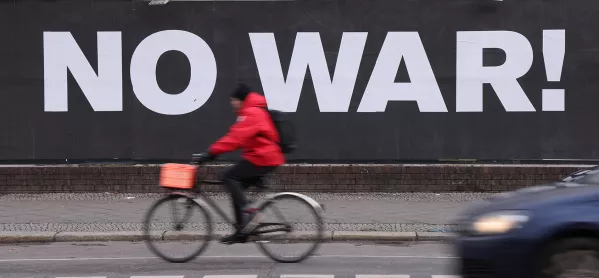It’s a toss-up whether to be impressed or concerned when students come into your class asking you only questions like “Are we going to get bombed?” or “Is this World War Three?”. It’s that balance of being happy that they are aware and engaged enough to ask mixed with some trepidation that their main news source is whatever comes up on their “for you page” on TikTok.
I make no secret of the fact that I love teaching modern studies, a subject that is distinct to Scotland. It continues to amaze me that there are schools in Scotland that don’t teach it at all. In my view, it should be a compulsory subject in every school taught by subject specialists so that young people are learning from first year the vital skills they need to navigate complex news stories like this, and with a little background knowledge in their pocket to understand them.
Days like this are partly why I love my subject so much. Of course, there is a curriculum and you can’t throw your teaching plan out of the window completely, but also it’s 6am and I’ve just woken up to the news that there is an invasion underway in Europe. The day calls for changing the lesson plan a bit.
The question is, then: how do you boil down a thousand years of Ukrainian-Russian history and a complex web of connected causes and impacts into a brief starter task that keeps students engaged but doesn’t terrify them? Sticking to some key discussion points usually works best - you can bet by the time you’ve covered the first slide there’ll be 10 hands up in the room. My first classroom expectation for students is “be curious, ask questions, say what you think”, after all.
Teaching students about the Ukraine crisis
We started with some geography - where is Ukraine? My third years did considerably better at that task than the Americans asked to point out Europe on TikTok, so that’s a comfortable start. Then on to some history - how did Ukraine and Russia come to be? How does a country of mixed cultures, languages and heritage decide on its identity? The history leads neatly on to the modern studies - what is going on in Ukraine right now? Snap Map helped here, and some social media on the ground.
Perhaps the most important outcome from lessons like these isn’t the knowledge itself but the skills students take away beyond the lesson: how to identify fake news; recognising that misinformation is as much a weapon in war as guns and tanks. One student says she just saw a video of Russian fighter jets flying over Scotland. I ask how she knows (quietly ignoring the fact that phones weren’t supposed to be out in this period - it’s relevant research, I guess). “It says it in the caption,” she says. A teaching moment if ever there was one.
We watch the first 10 minutes of the lunchtime news live on the BBC, which prompts more questions about what happens next. When will it all be over? Teaching moment number two - a reminder that we don’t have all the answers.
I live for moments like this in the classroom because student engagement is everything. Their curiosity is inspiring. Does it all fit within a social studies experience and outcome? Maybe not. But it is vital that young people are engaged in a meaningful way with events like this - events that will shape their lives now and their future.
Michael Shanks is a modern studies teacher in Scotland. He tweets @mgshanks




